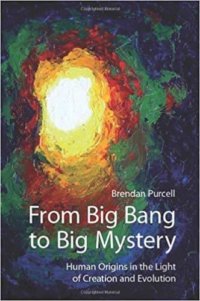From Big Bang to Big Mystery: Human Origins in Light of Creation and Evolution

From Big Bang to Big Mystery: Human Origins in the Light of Creation and Evolution. Brendan Purcell. New York: New City Press, 2012.
Brendan Purcell’s From Big Bang to Big Mystery is an extremely ambitious book, and what is marvelous is that it succeeds in its ambitions. Exploring the question of human origins and development within the context of cosmic evolution, Purcell relies on both the best of scientific perspectives and the best of philosophical and theological resources to explore why and how human beings are unique. The book is as balanced and insightful a study of human emergence as one might hope for in our day, a period dominated by misleading science-versus-religion conflicts and ideologies.
Purcell’s book is filled with appreciation for good scientific theory, good philosophy, and good religious thought. It won’t appeal to those who are dogmatically anti-religious or dogmatically anti-scientific (or anti-philosophical).Such folk wouldn’t allow for the examination of the complementarity between theories of evolution, neo-Darwinian thought, paleoanthropology, hominid development, DNA-based evolutionary research, and science in general on the one hand, and on the other, appreciation of what is best in philosophical anthropology, including analyses of humans as language-speakers and symbol-and-myth-makers, of humans as capable of freedom and of choosing evil, and of humans as morally and spiritually oriented, ultimately, to a divinely transcendent reality of goodness, truth, beauty, and love.
Purcell’s mastery of both the relevant science and of the philosophical issues is based in part on the philosophies of Bernard Lonergan and Eric Voegelin; Lonergan in particular supplies Purcell with an indispensable heuristic map for understanding emergence and “emergent probability” in the cosmos. Voegelin’s approach to and insights regarding the development of consciousness, human self-orientation through myth, philosophy, and science, and the normativity of human openness to the mysteries of being and the divine, are also central to his analysis.
Purcell has also read a huge amount of other relevant philosophical, scientific, and theological literature, and makes astute references to thinkers such as Aristotle, Aquinas, Buber, and Kierkegaard, as well as to contemporary figures such as Sophie Scholl and Etty Hillesum. Building on all the scientific material, by way of addressing carefully the question “What makes us humans?” he eventually deals impressively with the question of evil and the issue of living in untruth and telling lies, in the context of explaining freedom and the moral and spiritual stature of humans.
Anyone reading the book gets a clear understanding of the problem of dehumanizing “from below up” (i.e., scientistic reductionism) as well as from “above down” (e.g., statism and totalitarianism). The treatment of Dawkins and Dennet and Hawkings et. al. is filled with respect and appreciation, but dialectically diagnoses both their strengths and their metaphysical missteps. The book presents a remarkable synthesis of materials pertaining to the dialogue between religion, philosophy, and science, and it shows clearly, to an open mind, how the finest science and the finest philosophy and theology are fully compatible.
Also see excerpt of the book here and Christopher S. Morrissey’s review here.




